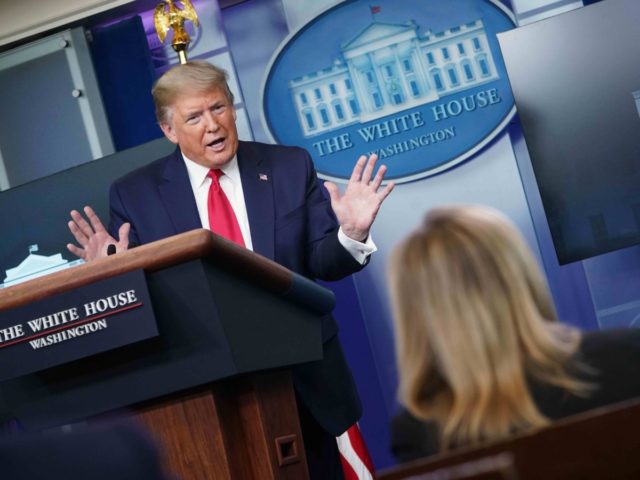The White House Press Corps challenged President Donald Trump’s contention Monday that he has the “total” authority to reopen the U.S. economy after the coronavirus abates — after pestering him for weeks to impose a national shutdown.
In every previous case, Trump said that the Constitution’s federalist structure gave governors primary authority, but stated that he could also overrule them.
The media pushed him to assert his executive power — which they are now questioning:
- On March 30, Trump was asked to respond to Virginia Gov. Ralph Northam (D) imposing a 70-day stay-at-home order. He responded: “Well, we’re letting the governors do in their states pretty much what they want with our supervision, and they consult with us in all cases.”
- On April 1, a reporter asked Trump to contradict Florida Gov. Ron DeSantis (R), who had refused to issue stay-at-home orders at that point. The president responded that he had the power to do so, but “unless we see something obviously wrong, we’re going to let the governors do it.”
- On April 3, a reporter asked Trump: “Should every state in this country have the kind of stay-at-home orders that we now see in places like Washington and New York?” He replied: “I leave it up to the governors. The governors know what they’re doing. … I like that from the standpoint of governing, and I like that from the standpoint of even our Constitution.”
- On April 5, reporters urged the president to challenge “eight governors, all Republicans, who have refused to issue … statewide stay-at-home orders.” Trump answered: “We have a thing called the Constitution, which I cherish, number one. Number two, those governors — I know every one of them — they’re doing a great job.” He added that he had the power to “supersede” them, but did not want to use it.
- On April 7, Trump was asked to contradict “a number of governors who are close allies of yours … who have refrained thus far to have these stay-at-home orders.” Trump said that while he had the power to do so, he wanted to respect the federalist structure of the Constitution: “I can do it, but it is a constitutional — you can say federalist, you can say there’s lots of different reasons, where I would rather have the governors do it, make their own determination.”
- On April 10, the president was asked whether he would allow DeSantis to re-open schools in May. He answered: “I like to allow governors to make decisions without overruling them, because from a constitutional standpoint, that’s the way it should be done. If I disagreed, I would overrule a governor, and I have that right to do it. But I’d rather have them — you can call it ‘federalist,’ you can call it ‘the Constitution,’ but I call it ‘the Constitution.'”
The president’s stance was the same throughout. He argued that he had the constitutional authority to “supersede” governors and to shut down the economy in their states, but that he preferred to defer to the governors, according to the federalist structure of the Constitution.
Now, the media are challenging the very power they pressured Trump to assert just days ago.
There is a legitimate constitutional question as to whether the president can “close” or “re-open” the economy. As liberal scholar Jonathan Turley — who sided with the White House during impeachment — the president does not have “absolute” power:
The Associated Press presented a more detailed argument against the constitutional position the president asserted Monday.
The point is that Trump has maintained the same view throughout, while the media have flip-flopped completely, perhaps changing their view based on whatever they believe is politically most inconvenient for the president.
On Monday, Trump did not cite the text of the Constitution he believes grants him authority over closing or re-opening the national economy, but promised to provide a legal justification for his stance.
One possible constitutional argument would be as follows:
- The Interstate Commerce Clause in Article I gives Congress the power to regulate commerce “among the several States”;
- a related clause, the No Preference Clause, restricts how states may insulate their economies from those of other states;
- the Faithful Execution Clauses in Article II give the President the duty to carry out the laws Congress passes; and
- the Supremacy Clause in Article VI makes the Constitution and federal law the “supreme law of the land.”
That supremacy is balanced by the Tenth Amendment, which reserves powers for the states that are not already granted to the federal government. As the AP notes, state powers cover public order and safety.
Vice President Mike Pence, who was put on the spot by a reporter who invited him to contradict the president, argued that the president’s authority during a national emergency is “unquestionably plenary.”
Video Source: White HoueIt is possible that these powers are not entirely congruent — that is, the president may have authority to restrict commerce due to a public health emergency, but not to override all lingering state and local restrictions once an emergency has passed. (No one in the White House Briefing Room has yet drawn such subtle distinctions.)
The entire question may be moot, as the president suggested, because most of the governors do not want to keep their states closed; they share an interest in re-opening their economies as soon as possible.
Joel B. Pollak is Senior Editor-at-Large at Breitbart News and the host of Breitbart News Sunday on Sirius XM Patriot on Sunday evenings from 7 p.m. to 10 p.m. ET (4 p.m. to 7 p.m. PT). His new book, RED NOVEMBER, is available for pre-order. He is a winner of the 2018 Robert Novak Journalism Alumni Fellowship. Follow him on Twitter at @joelpollak.

COMMENTS
Please let us know if you're having issues with commenting.